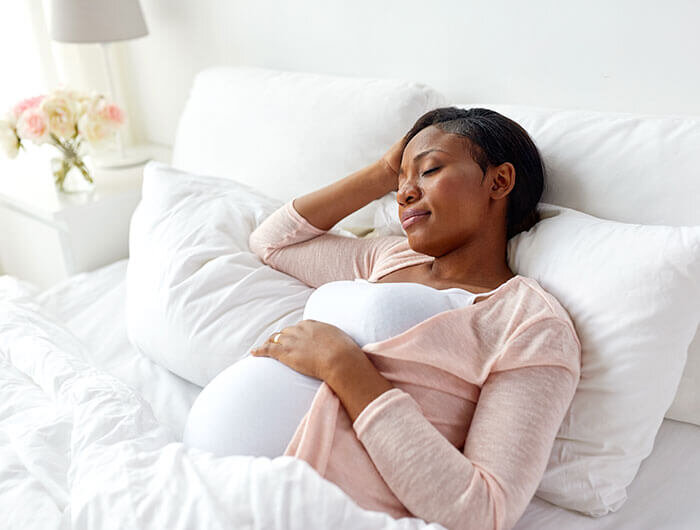Pregnancy Sleep Tips
Get Quality Deep Sleep For Pregnant Moms With These Top Sleeping Tips
Despite feeling exhausted during the day, many expectant moms find that restful, comfortable sleep becomes elusive as pregnancy progresses.
The reality is, sleep during pregnancy is essential for both your health and your baby’s development, but it’s often disrupted by physical discomfort, hormonal changes, and anxiety. Finding the right sleeping positions and adopting strategies to improve sleep quality can make a world of difference.
With these essential sleeping tips for pregnancy, you can navigate the unique challenges of this journey and enjoy more restful nights. From finding the best sleep positions to managing common discomforts, these practical tips will help you master the art of sleeping for two.
Why is Sleep Important During Pregnancy?
Sleep is important for everyone - you too, dads! - but unfortunately, getting the rest that your body needs while pregnant is often easier said than done.
Why sleep is important during pregnancy?
It takes a lot of energy to grow a baby, and your body is working a lot harder than normal. Plus, changing hormones and other sleep-related issues can make getting in a good night’s sleep a major challenge.
The first step in getting enough sleep is to understand why, exactly, sleep is so important during pregnancy. For starters, pregnant women need more energy than the average person since their bodies are undergoing major physical changes and demands. Your body needs energy to repair and recover, which is particularly important for women throughout their pregnancies.
In fact, while the average woman needs just 7-9 hours of sleep per night, a pregnant woman needs up to 11 hours just to function!
It’s not just the increased energy requirements that may have you feeling sleepy throughout the day. There’s also your weight gain to consider. Pregnant moms have certain recommendations for gaining weight, and not getting enough sleep can negatively impact your ability to gain weight. You might gain too much weight or gain too little, both of which can put your baby at risk.
It’s equally important for pregnant women to be active so that they keep their weight gain under control and to stay strong. Too little sleep can reduce your motivation to stay active.
Finally, let’s consider your emotional state. Sleep deprivation has a whole host of mental and emotional problems. It can lead to anxiety, depression, and other problems with your emotional state. Sure, mood swings are common - even expected! - for pregnant moms, but lack of sleep can make mood swings all the more pronounced (and severe).
How Pregnancy Affects Sleep
Okay, so you’re going to commit to getting at least nine hours of sleep per night - great!
Easier said than done.
Top Sleeping Tips During Pregnancy
Unfortunately, pregnancy puts some serious demands on pregnant moms both physically and emotionally. All of these can impact your overall comfort levels, mood, and of course, sleep. You may notice serious physical symptoms during your pregnancy that aren't necessarily related to poor sleep, but can in turn, cause it. These include nausea and vomiting, backaches, cramps, headaches, heartburn, and an increased frequency of urination.
Changing hormones are mostly to blame for these sleep issues. In fact, in one study, women who had higher levels of estrogen, cortisol, and progesterone were found to have a higher incidence of common sleep disorders like insomnia.
When a woman is pregnant, she is far more likely to suffer from new (or simply more intense) sleep-related issues as she moves through each trimester.
First Trimester
During the first trimester, elevated hormone levels alone are enough to make expectant moms feel exhausted. You are going to be experiencing an increase in your metabolism and blood production along with lower blood pressure. If you're working and/or taking care of a family, this can add to your fatigue.
First Trimester - Pregnancy Sleeping Tips
You’ll likely find that you sleep a lot more during your first trimester (the first 12 weeks of pregnancy). You might suffer from a variety of sleep-related issues during this time, too, including frequent urination, aches and pains, and nausea, also known as morning sickness.
Here are a few tips for combatting the unending fatigue of the first trimester.
First, take naps whenever you find that you need to rest. Your body will tell you when it’s time to slow down. Sleep on your side and use lots of pillows to help get comfortable. Make sure you drink plenty of fluids during the day so you’re not awake using the bathroom at all hours of the night. Maintain a consistent bedtime schedule and a healthy sleep environment and try to exercise as often as you can to promote better sleep.
You may also want to keep a few light snacks by your bedside to eat in case morning sickness strikes in the wee hours of the morning.
Second Trimester
During the second trimester, many of the pregnancy-related sleep issues of the first trimester fade away. This includes morning sickness along with many of the early aches and pains.
Second Trimester - Top Pregnancy Sleeping Tips
As a result, the second trimester is often viewed as the easiest trimester and pregnant women will start feeling like themselves again. Often, they'll experience a boost in energy and return to more normal sleep patterns - but that’s not to say you still don’t need a solid nine to eleven hours of sleep!
During this trimester, a baby will grow rapidly and you’ll begin to feel more normal. However, as the weeks progress, you’ll have a few other issues pop up to wreak havoc on your sleep.
Backaches, for example, tend to pop up around this time as the baby puts more pressure on your back. Sleep on your side and during the day, wear comfortable shoes. This can help reduce foot and leg pain and cramping at night, as can sleeping with a pillow between your legs.
Leg cramps can be equally uncomfortable, but taking hot baths or showers, stretching, and staying hydrated and active can help.
Again, frequent urination will be a pain during the second trimester, which can lead to poor sleep. Avoid drinking too many liquids right before bed and keep yourself hydrated during the rest of the day instead.
Better Sleep During Second Trimester Of Pregnancy
A final problem that you might notice as the second trimester inches on is heartburn. This is common, particularly as your body produces more hormones. It can keep you up at night, particularly if you eat a lot of spicy or acidic foods.
To get better sleep during your second trimester, you should follow all of the same tips that you did in the first. Try to sleep as much as you can and use pillows to prop yourself up. Take naps as often as possible and keep your head elevated so that heartburn can be prevented.
Third Trimester
The third trimester is the “home stretch” of pregnancy, and it’s also when the baby will make the biggest leaps in development and physical size. As an expectant mother, your body is still changing and you’ll notice a variety of issues that affect your sleep and comfort.
One of the biggest is adjusting to the baby's sleep routine. While you have your own habits you’d prefer to follow, your baby has his own patterns of sleep and may wake you up at all hours of the night with his movement and kicks.
Some of the most common sleep killers of the third trimester include leg cramps, heartburn, backaches, and frequent urination. You might notice that you wake up a lot more during the night, perhaps to urinate, or perhaps just because. One study by the National Sleep Foundation found that women woke more than three times per night on average. This can make it a challenge to get quality sleep.
You might also find yourself snoring. Snoring is not only disruptive to your sleep (it’s caused by swelling and congestion) but it could also be an early sign of sleep apnea. Restless leg syndrome is another problem that commonly affects pregnant women, with about 15% of expectant moms developing this sleep-killing condition.
During the third trimester, along with the other two trimesters, of course, it’s important that you get adequate rest. Sleep deprivation has been shown to have negative outcomes during labor and delivery - you need your rest for that final push!
Do everything you can to log quality hours between the sheets. Eat a healthy diet and exercise regularly. Avoid carbonated beverages and keep your head elevated to prevent heartburn. Sleep on your left side with a pillow between your legs and be sure to talk to someone if you find that bad dreams or nightmares are waking you up at night.
Postpartum
Top Pregnancy Sleep Advice
Pregnancy is over - so that means better sleep, right?
Wouldn’t that be nice. Unfortunately, the postpartum period is often referred to as the fourth trimester because there are just as many sleep-related challenges as pregnancy. In this trimester, both you and your baby will have to adjust to a new sleep reality.
Newborns wake often, and it will be important for you to develop some sort of a schedule early in your baby’s life. This will help ensure your baby gets the sleep he needs.
Even the best and most meticulous schedule, though, can make it tough for you to get the rest you need. Constantly waking to feed and care for your baby can be overwhelming and often leads to sleep deprivation and fatigue. Mothers are at increased risk of postpartum depression during this period not only because of sleep deprivation but also because of stress and hormonal changes.
It’s essential that you don’t neglect to care for yourself as you are learning to care for your new child in this postpartum period. Again, continue to eat a healthy diet and get exercise when you can. Keep a consistent bedtime schedule and don’t be afraid to talk to a counselor or doctor if you experience any symptoms of depression or anxiety. Try to avoid taking on more responsibility than you have already and sleep when your baby sleeps.
It might be difficult, but try to divide up household responsibilities with your partner. This can lighten your load so that you can get better sleep.
Sleep Positions
Another thing to pay attention to when you are trying to get high-quality rest during pregnancy is what kinds of sleep positions you tend to sleep in. The changes that your body undergoes during pregnancy will no doubt require you to seriously think about how you sleep. Your body will be larger and a different shape and your symptoms of pregnancy will affect the way you sleep in your preferred position.
The American Pregnancy Association universally recommends that pregnant women sleep on their sides. Consider sleeping on your left side (which offers better blood flow from your body to the baby) and place a pillow between your bent knees. This position will not only make you more comfortable, but it can reduce swelling and back pain, too.
Avoid sleeping on your back and stomach whenever possible. If you wake up in one of these positions, don’t panic - but know that there are some issues that might be caused by sleeping on your back or stomach, too.
For example, back sleeping can cause low blood pressure and poor circulation, along with hemorrhoids and digestive problems. Sleeping on your stomach, however, can cause strain to your neck, back, and spine.
Sleep Disorders and Pregnancy
Of course, pregnant women aren’t the only demographic at risk for sleep disorders, but you’re much more likely to suffer from a sleep-related issue during the nine (or really, ten!) months of pregnancy than you are as a non-pregnant woman.
How Pregnancy Affects Sleep
Sleep apnea, for example, is much more common during pregnancy. This condition causes you to stop and start breathing periodically throughout the night - hundreds of times, in fact. Symptoms include a sore throat in the morning, tossing and turning, and snoring.
Pregnancy narcolepsy can also occur. This disorder causes you to fall asleep at any time without notice. It’s very uncommon, but you should talk to your doctor if you suffer from this ailment.
Of course, insomnia can strike both before, during, and after pregnancy. Insomnia is when people have a hard time falling or staying asleep, wake up too early, or feel unrefreshed. As a result, you may suffer from related conditions like poor work performance, anxiety, stomach issues, and headaches.
As your pregnancy progresses you are far more likely to develop symptoms of insomnia - even if you always were a great sleeper before. Be sure to talk to your doctor about options that can be safely pursued during your pregnancy to treat your insomnia.
Get The Sleep You Need and Crave During Pregnancy With These Top Sleeping Tips
Getting the sleep you need - and crave! - during pregnancy can be a challenge. Fortunately, by following the pregnancy sleeping tips above, you’ll be able to log some quality zzz’s throughout every trimester of pregnancy - perhaps even after the baby arrives.
Jessica Lauren is Founder, contributing Author and Owner of Citrus Sleep. Citrus Sleep is an online publication that highlights brands, sleep products, women’s fashion, subscription services and ideas creating positive social change and promoting a healthy lifestyle. After spending nearly a decade working in PR and marketing for several brands and startups, Jessica knows what truly drives conversions, sold-out launches and guest posts.
Follow Jessica at @jessicalaurencs | Jessica Lauren






















